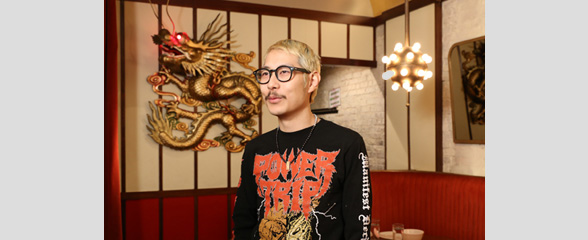 | Danny Bowien is the co-founded of Mission Chinese Food (locations in both San Francisco and New York) and a chef of Chinese cuisine. He details his experience growing up as a Korean adoptee of American parents in Oklahoma and how his later career development led him on the eventual path of cooking Chinese cuisine. In the interview, he expounds on how and why he fell in love with Chinese food, where he draws inspirations from for his own recipes, and his view of his own role as a chef as well as expectations of the restaurant’s future. |  | Peter Chang is a chef and restauranteur who owns and operates a series of restaurants in the D.C. area, including Peter Chang Café, Peter Chang’s China Café, Q by Peter Chang, and the most recent Mama Chang. In the interview, Mr. Chang speaks about his incredible journey from his childhood in rural Hubei, his time in culinary school, his success as a chef in China, how he came to America, and how he survived then thrived in America, eventually garnering media attention in the US from reputable magazines and newspapers. He shares not only his stories but also knowledge about cooking styles and restaurant operations, expressing his continued pursuit of innovation and growth of Chinese food in Americas food and drink industry. |  | Nancy Chen, brought up in Taiwan and an immigrant to the US since 1996, speaks about the role of cooking and Chinese food in her life. She details the way Chinese food and her own journey in home cooking has played a constant role in her life as an immigrant in America while commenting on the changes Chinese food has undergone in America during her time here. Her narration contains plenty of anecdotes about her experiences with food both during her childhood and adulthood while she expresses her views on the importance of food in the family life of immigrants. |  | Chris Cheung is a Chinese-American chef who owns the restaurant, East Wind Snack Shop. He was raised in Chinatown and Bensonhurst, exposing him to both Chinese and Italian food at a young age. He grew up in 1970s and 1980s New York and recalls generational differences in Chinese restaurants. The teahouses that he enjoyed as a child have transformed. As Cheung grew older, he worked at several Asian restaurants. He began to work with high profile names in the culinary world; he learned technical skills. When Cheung took a trip to a rural village off the coast of Shanghai, he experienced cooking daily banquets. Afterwards, he studied with a Hong Kong dim sum master, who helped him perfect his craft.
As Cheung ancestry is from Toisan, China, he was inspired to recreate a Toisan teahouse. East Wind Snack Shop specializes in dumplings, baos, and dim sum. Cheung wanted to revive the community aspect the teahouses brought; these teahouses were replaced by bakeries. Cheung explains the way Asian cuisine has no weight in the culinary world. He hopes that his legacy will pave a way for Chinese cuisine to enter the mainstream and serve many. | 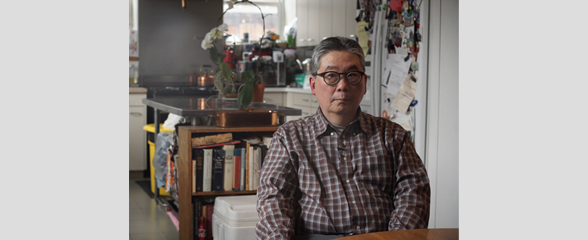 | George Chew was born in 1950 and grew up in New York Chinatown. His family immigrated from the southern Chinese island province of Hainan. His father was not home often because of work, yet he enjoyed his father’s cooking, and eventually learned to cook on his own. Chew’s skillset grew when he moved to Washington to study law. Now an immigration judge, Chew continues to cook and hold banquets. Of these gatherings, he cooks both western and Chinese food. Chew gets his influence from cook books and learns to adapt recipes to be his own. He believes that good ingredients are the key. While contributing to a potluck, Chew dish won a competition he did not know about. He went on to compete at a national cookoff in Chicago. Chew was a poet and currently a lawyer. Though, he is immensely proud of his contribution to Chinese cuisine. | 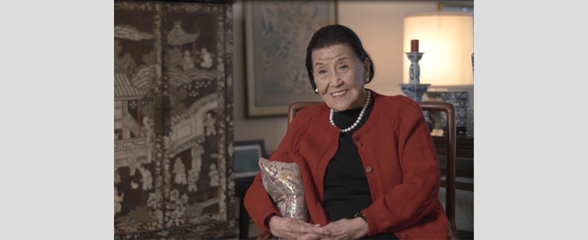 | Cecilia Chiang shares her incredible life story from wartime China all the way to becoming a restaurant owner in New York City. Her interview is riddled with her fascinations towards Chinese cuisine as she narrates the role Chinese cuisine has made during the turbulent events of her life, from her journey to Chongqing during the Japanese invasion of China to her time in Japan. She expresses her fondness of Chinese cuisine through a genuine desire to share the wonderful variety of Chinese food as well as a historic appreciation for the culture surrounding Chinese cuisine and Chinese culinary practice. | 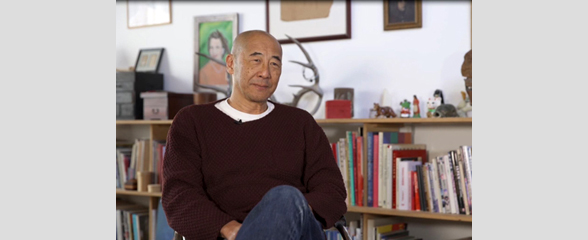 | Philip Chiang was born in Shanghai, China in 1948. Within a year, his family moved to Tokyo, Japan to avoid Chinas communist regime. He lived in Japan until the age of 14. He valued Japanese culture and the emphasis on hospitality. In 1962, he moved to San Francisco. His family lived there before it became the known, multicultural city it is today. His family ate out frequently, and it gave him the opportunity to enjoy many different cuisines. He grew especially fond of Italian food. Cecilia Chiang, his mother, opened a Chinese restaurant called the Mandarin Restaurant. The Mandarin became known in San Francisco as a high-end Chinese restaurant; it served the stars of Hollywood. Though Chinese cuisine was not new in San Francisco, the Mandarin popularized a refined northern Chinese cuisine. Philip Chiang helped at the family restaurant but did not get interested in the business until he was married. He worked in design and wanted to make more money. Thus, in 1984, he opened the Mandarette. Compared to the Mandarin, Chiangs alternative was cheaper. His clientele was younger and more progressive; it suited the urban and artistic landscape. At the Mandarette, he met Paul Fleming. Fleming continued to support the Chiang familys businesses even when the Mandarette closed. Fleming asked Chiang to help him open a Chinese restaurant in Arizona. In 1982, the now chain restaurant, P.F. Changs, opened its first location in Scottsdale, Arizona. Throughout the years, Chiang maintains one value: food should be simple. He emphasizes recipes that have no more than three ingredients. | 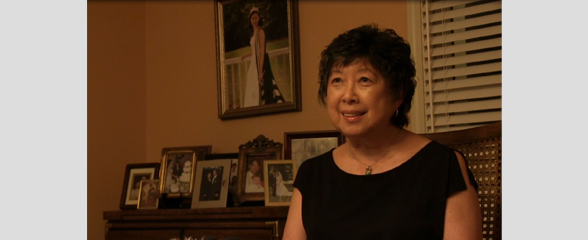 | In this interview of Gilroy and Sally Chow (interviewed separately), the couple talk about their relationship with food throughout their live. As second or third generation immigrants of an ethnic Chinese background who grew up in the American South, their interview reveals the way that Chinese food is passed down through generations as a powerful component of culture and the way it morphs over time to become apart of the multifaceted lives of immigrant families. Gilroy and Sally express the joy they find in cooking, the importance of cooking as a family value, and the way in which cooking plays a central role in their lives as they continue to recreate, innovate, and experiment with food. | 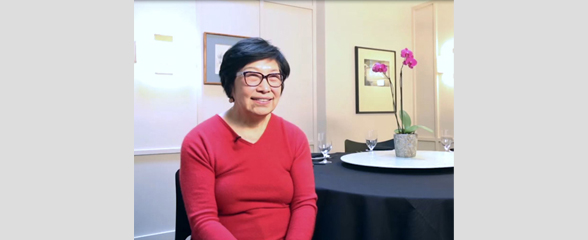 | Susanna Foo talks to MOCA about moving from place to place during her childhood in China as well as during her adulthood in the United States. She discusses attending school and working as a librarian before developing an interest in cooking which led her to become a chef. She shares her experiences at her familys struggling restaurant and how her studies at the Culinary Institute of America helped her turn it around and ultimately led to her opening another restaurant and even writing her own cookbooks. She concludes by sharing her thoughts on the importance of Chinese food to Chinese culture and the diverse influences that have formed her own eclectic cooking style. | 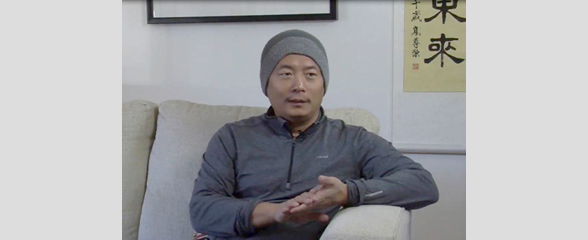 | Jeff Gao was born in 1976 in Shandong, China. He grew up during the end of the Cultural Revolution, thus he did not have an abundant amount of food to eat or experience. From a young age, he talks of his fondness of hand-pulled noodles and his determination to learn how to make the noodles from a chef he knew. Later, he went on to study in Beijing and eventually travel the world to learn about food internationally. His first restaurant Little Yunnan in Beijing was a huge success and the restaurant brought him success and fame in the food industry and was named one of the best restaurants in China. After the success of his initial restaurant, Gao eventually opened another restaurant in Boulder, Colorado in the United States. In his interview, Gao recounts his experience with food as he emphasizes the importance of high quality ingredients, cooking techniques, and cooking with serious passion. |









